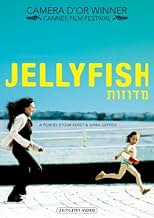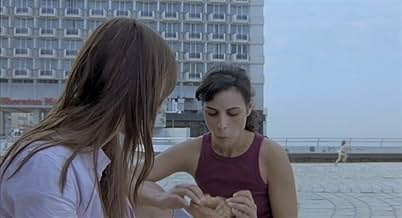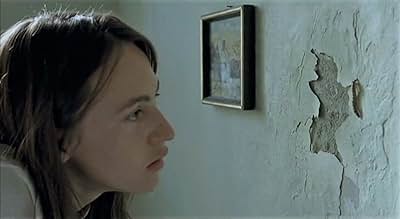IMDb RATING
7.0/10
2.8K
YOUR RATING
Intertwined destinies of characters who seek to break free from their solitude and find their place in society. Slowly, they manage to stay afloat and let themselves be carried along by life... Read allIntertwined destinies of characters who seek to break free from their solitude and find their place in society. Slowly, they manage to stay afloat and let themselves be carried along by life.Intertwined destinies of characters who seek to break free from their solitude and find their place in society. Slowly, they manage to stay afloat and let themselves be carried along by life.
- Awards
- 5 wins & 14 nominations total
Ma. Nenita Flores Dela Torre
- Joy
- (as Ma-nenita De Latorre)
- Directors
- Writer
- All cast & crew
- Production, box office & more at IMDbPro
Featured reviews
NICE : As Paul Thomas Anderson with "Magnolia", Etgar Keret and Shira Geffen chose with "Meduzot" to focus on a few characters that life randomly carries from one shore to another. Everything is tainted by a depressive but amusing tone that gives a pleasant melancholia feeling to the spectator. The fact that the story happens in Tel-Aviv does't seem to affect the lightness of this unpretentious movie, that only wants to underline the loneliness every human being faces in his life and give a little touch of hope to this sad fact.
EASY : As Agnès Jaoui in "Le Goût des autres", Etgar Keret and Shira Geffen don't avoid in "Meduzot" some very easy and predictable critics, especially when it comes to give a satirical look on the artistic world of theater of the city. They also can't avoid some "Shortcuts" in the portrayal of their characters, and especially in the depiction of the angry - but at the end nice and well... just lonely - old lady. This two elements spoil a little bit the pleasure you can get to the pleasant little scenes the film offer.
EASY : As Agnès Jaoui in "Le Goût des autres", Etgar Keret and Shira Geffen don't avoid in "Meduzot" some very easy and predictable critics, especially when it comes to give a satirical look on the artistic world of theater of the city. They also can't avoid some "Shortcuts" in the portrayal of their characters, and especially in the depiction of the angry - but at the end nice and well... just lonely - old lady. This two elements spoil a little bit the pleasure you can get to the pleasant little scenes the film offer.
This is a loosely woven story about different people who all live in the same city, and occasionally cross paths, but do not know each other. The stories of the individual characters at first seem ordinary, but there are hidden insights into their lives that are touching. An elfin from the ocean adds an unresolved aspect.
Does it matter that the protagonist barely has a roof over her head, while her publicity-seeking mother champions the cause of the homeless? Does it matter that parents and offspring misunderstand each other, or worse, are apathetic? Does it matter that the elfin with the float ring mysteriously appears and disappears. Life itself is this way, rarely neat and tidy.
To those who like a film to be obvious with its message and linear with its storyline, this film will disappoint. To others who are willing to just watch and float along, this movie will have you enjoying it long after the closing credits have rolled. Definitely a film to talk about!
Does it matter that the protagonist barely has a roof over her head, while her publicity-seeking mother champions the cause of the homeless? Does it matter that parents and offspring misunderstand each other, or worse, are apathetic? Does it matter that the elfin with the float ring mysteriously appears and disappears. Life itself is this way, rarely neat and tidy.
To those who like a film to be obvious with its message and linear with its storyline, this film will disappoint. To others who are willing to just watch and float along, this movie will have you enjoying it long after the closing credits have rolled. Definitely a film to talk about!
Jellyfish, for all its generous spirit and life-affirming moments, doesn't shy away from the little absurdities that inundates everyday existence. Even in the same frame there is a glow amid the isolation and personal embitterment. An unbearable lightness that cannot help but expose the chalky hands of fate. Those who have ever asked in exhaustion, "why me?" can find a lot to love about this little Israeli import.
The film is told through a hyperlink narrative. Though its themes are much more ethereal than those of Traffic (2000) or New Year's Eve (2011). That and the narratives don't so much interlock as they migrate towards and away from each other. We follow the progression of three struggling women adrift in noisy Tel Aviv, vexing over life's ennui. While doing so, the women cross paths, barely glimpsing each other's existential angst.
The first women is the young Batya (Adler). She's a sullen, ineffectual banquet hall waitress, struggling to keep her job and an apartment that's slowly falling apart. Meanwhile her divorced, working professional parents all but ignore the warning signs of her mounting depression, brought about when her boyfriend leaves her. Unexpectedly, while trying to relax at the beach, a mute child (Leidman), freckled and wet, appears like a vision. She tries to find out to whom the child belongs to, to no avail.
The second woman of our story is newlywed Keren (Knoller) whose Caribbean honeymoon has been botched by a faulty bathroom stall. Her ankle now broken, she tries to make the best of a worsening situation, by following her husband Michael (Sandler) to an aging sea side hotel in town. It is there that Michael meets an attractive writer (Albeck) whose femme fatale allure threatens the strength of their new marriage.
The third woman is a Filipino caretaker named Joy (De LaTorre). Joy tries and repeatedly fails to connect with her employer (Harifai) whose tersely shouts in Hebrew and German, neither of which Joy speaks. She pines to have her son with her, vainly communicating with him through short collect calls and promises of gifts and visits.
A common motif that permeates all three stories is that of water. Joy is mesmerized by a toy boat she wants to get her son, while Keren complains that they're a short walk from the beach yet can't see the sea. She also begins to write a poem, wistfully equating her feelings of isolation to that of a ship in a glass. Finally there's Batya whose discovery of the child on the beach, unlocks dormant traumas that include her parents arguing as the young Batya drifts out to sea in an inflatable tube. Could the water represent transition and the possibility of renewal? Perhaps yes, perhaps not.
The magical realism that seeps into the lacquered grooves of this film brings with it occasionally irksome subjectivity that's nearly impossible to decode. This film doesn't hold your hand but rather lets you explore the serendipity of Jellyfish's world through the eyes of three women who are dulled by constant misfortune. Some may find their woes pedestrian and cloying, especially considering the film is Israeli and completely ignores political realities. Yet choosing characters that exhibit the incessant, hard to describe hum of anxiety and depression gives the film both a timelessness and a universality. In the end, there's solace in the arms of others; a lesson that those quietly suffering would be wise to heed.
While occasionally stodgy, Jellyfish doesn't wear out its welcome, finding just enough pulp in the stories while reveling in some art- house expressions and compositions. The subjectivity of its framework works in its favor to deliver a film that can be read in many ways, including being a frank and effective meditation on depression. It does all this without being showy or overly pretentious but instead lingering on the deflation of character expectations, before rewarding its audience with small but meaningful victories.
The film is told through a hyperlink narrative. Though its themes are much more ethereal than those of Traffic (2000) or New Year's Eve (2011). That and the narratives don't so much interlock as they migrate towards and away from each other. We follow the progression of three struggling women adrift in noisy Tel Aviv, vexing over life's ennui. While doing so, the women cross paths, barely glimpsing each other's existential angst.
The first women is the young Batya (Adler). She's a sullen, ineffectual banquet hall waitress, struggling to keep her job and an apartment that's slowly falling apart. Meanwhile her divorced, working professional parents all but ignore the warning signs of her mounting depression, brought about when her boyfriend leaves her. Unexpectedly, while trying to relax at the beach, a mute child (Leidman), freckled and wet, appears like a vision. She tries to find out to whom the child belongs to, to no avail.
The second woman of our story is newlywed Keren (Knoller) whose Caribbean honeymoon has been botched by a faulty bathroom stall. Her ankle now broken, she tries to make the best of a worsening situation, by following her husband Michael (Sandler) to an aging sea side hotel in town. It is there that Michael meets an attractive writer (Albeck) whose femme fatale allure threatens the strength of their new marriage.
The third woman is a Filipino caretaker named Joy (De LaTorre). Joy tries and repeatedly fails to connect with her employer (Harifai) whose tersely shouts in Hebrew and German, neither of which Joy speaks. She pines to have her son with her, vainly communicating with him through short collect calls and promises of gifts and visits.
A common motif that permeates all three stories is that of water. Joy is mesmerized by a toy boat she wants to get her son, while Keren complains that they're a short walk from the beach yet can't see the sea. She also begins to write a poem, wistfully equating her feelings of isolation to that of a ship in a glass. Finally there's Batya whose discovery of the child on the beach, unlocks dormant traumas that include her parents arguing as the young Batya drifts out to sea in an inflatable tube. Could the water represent transition and the possibility of renewal? Perhaps yes, perhaps not.
The magical realism that seeps into the lacquered grooves of this film brings with it occasionally irksome subjectivity that's nearly impossible to decode. This film doesn't hold your hand but rather lets you explore the serendipity of Jellyfish's world through the eyes of three women who are dulled by constant misfortune. Some may find their woes pedestrian and cloying, especially considering the film is Israeli and completely ignores political realities. Yet choosing characters that exhibit the incessant, hard to describe hum of anxiety and depression gives the film both a timelessness and a universality. In the end, there's solace in the arms of others; a lesson that those quietly suffering would be wise to heed.
While occasionally stodgy, Jellyfish doesn't wear out its welcome, finding just enough pulp in the stories while reveling in some art- house expressions and compositions. The subjectivity of its framework works in its favor to deliver a film that can be read in many ways, including being a frank and effective meditation on depression. It does all this without being showy or overly pretentious but instead lingering on the deflation of character expectations, before rewarding its audience with small but meaningful victories.
The female heart is shared through four, perhaps five female roles, and a token male. I say token because, perhaps like in the lives of all women as they compete with one another yet strive mutually for acceptance, men can often be little more than an accessory. Here the hopes, pains, and disappointments of wives, mothers, daughters, and career women are shared in a very poetic and imaginative way. Wonderful cinemoatography. The use of setting is especially effective.
This film is an elegant, simply told, and uplifting look at ordinary life. Although it relates the problems of the cast of main characters at different stages in their various lives, it does so with many small touches of humour, which lifts the mood along the way. Above all, expect a good, tight, literary script, which manages to weave together the disparate story lines to make a convincing whole. I saw this at the Dublin Film Festival, and I hope very strongly that it makes it to general release in Ireland and the UK. There are a lot of inferior art-house films which get distributed because they have big names behind them. However, Jellyfish, I think, shows you can have the serious and thoughtful, but in a lighter package.
Did you know
- TriviaDuring a screening of the film in Albany, New York, in 2009, co-director Etgar Keret stated that the title of the film is a reference to the fact that jellyfish drift in the sea and do not have much control over their fate or direction.
- How long is Jellyfish?Powered by Alexa
Details
Box office
- Budget
- $1,800,000 (estimated)
- Gross US & Canada
- $341,221
- Opening weekend US & Canada
- $25,352
- Apr 6, 2008
- Gross worldwide
- $938,881
- Runtime
- 1h 18m(78 min)
- Color
- Sound mix
- Aspect ratio
- 1.85 : 1
Contribute to this page
Suggest an edit or add missing content






































